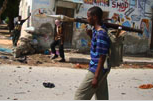
A strike by U.S. commandos on an al-Qaeda ringleader in Somalia last week—and the retaliatory violence and increasingly fiery rhetoric from Somali extremists in its aftermath—illustrates the delicate relationship between narrow U.S. counterterrorism objectives and its broader foreign policy goal to increase stability in the Horn of Africa.
Early last week, U.S. special forces killed one of the most wanted Islamist militants in East Africa, Saleh Ali Saleh Nabhan, who was responsible for the 2002 suicide bombing of a hotel in Mombasa and involved in the attacks on American embassies in Kenya and Tanzania in 1998 that left 250 dead. The daytime helicopter attack on Nabhan’s convoy travelling in southern Somalia also killed several members of al-Shabaab, an extremist Somali militia that the U.S. has designated a terrorist organization. According to all available reports, there were no civilian casualties in the attack.
Seen strictly through a counterterrorism lens, the strike was successful. However, Somalia is a place where external intervention frequently leads to unintended consequences; here are several events in the days immediately following Nabhan’s death:
- Immediately following the U.S. air strike, al-Shabaab told the media that the group would avenge Nabhan’s death and issued a call for Muslim fighters to join their cause.
- Shabaab suicide bombers detonated explosive laden trucks inside the compound of the African Union peacekeeping mission. Al-Shabaab spokesman Sheikh Ali Mohamud Rage told Reuters, “We have got our revenge for our brother Nabhan. Two suicide car bombs targeting the AU base, praise Allah.”
- Al-Shabaab released a 48-minute video titled “At your service, Osama” showing members training and chanting bin Laden’s names.
- 17 people were killed when al-Shabaab attacked government soldiers in western Somalia, Sunday. Two days later, Islamic insurgents attacked an African Union peacekeeping base.
Al-Shabaab’s propaganda would be less likely to gain traction if most ordinary Somalis believed that U.S. involvement in their country was not limited to strikes against wanted terrorists and arms transfers to Somalia’s weak Transitional Federal Government, or TFG. The Obama administration hopes that by throwing its weight behind the TFG, comprised of Islamists with a more moderate bent, Somalia’s feeble government can achieve military victory and begin to stabilize the country. Unfortunately, the TFG is no where near defeating al-Shabaab and struggles to maintain control over limited ground in the capital. Even worse, recent reports of arms leakage from TFG forces to al Shabaab suggest that U.S. policy could unwittingly be strengthening the hand of the insurgents.
The resulting situation for Somalis is catastrophic. Atrocities against Somali civilians by all parties to the conflict continue. According to UNHCR, more than 1.5 million Somalis are currently displaced from their homes, subsisting without permanent shelter, a stable source of food and water, and poor sanitation. In early September, Oxfam called the international response to the humanitarian situation “shamefully inadequate.” Robbert Van den Berg, Oxfam International’s spokesman for the Horn of Africa, said, "Somalis flee one of the world’s most brutal conflicts and a desperate drought, only to end up in unimaginable conditions in camps that are barely fit for humans.”
What to do?
There are no simple answers to the vexing challenges in Somalia, but the United States and other concerned actors need to figure out ways to alleviate the suffering of ordinary Somalis (a task made much more complicated by the Treasury Department’s restrictions on U.S. food assistance going to Somalia) and satisfy their demand for accountability for the heinous crimes committed against them. As Enough pointed out in a strategy paper earlier this year, a U.N. commission of inquiry to investigate responsibility for war crimes and crimes against humanity would be a good place to start.
Colin Thomas-Jensen contributed to this post.
Photo: Militants patrol the streets in Mogadishu (AP/Mohamed Sheikh Nor)

